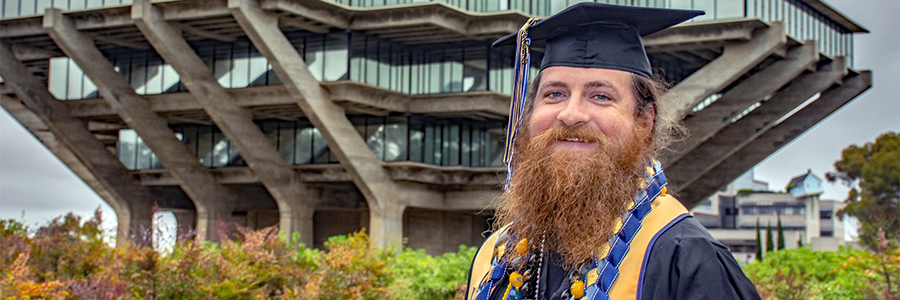Robert Walter

About Me
- Graduation year: Spring 2019 (summa cum laude)
- Majors: Philosophy (with highest distinction) and Cognitive & Behavioral Neuroscience (with distinction)
- College: Eleanor Roosevelt College
- AEP program participation: UC Scholars - TRELS - Undergraduate Research Conference - Summer Research Conference - Summer Research Program
My Research
I was privileged to join Professor Tim Brady’s Vision and Memory Lab in my first quarter at UC San Diego, tasked with investigating proactive interference in visual working memory; specifically, looking at the discrepancies in the literature between the degree and sources of this interference. Under Dr. Brady’s phenomenal mentorship and advisement, I was able to develop, run, and analyze eight different experiments where I gained invaluable experience in programming with MATLAB’s Psychtoolbox, interpreting data, and scientific writing.
I loved the challenge of creating new experimental techniques to isolate elusive and confounded effects, as well as delving into interpretations of these results. Every subject and data point is a chance to learn, and even null results, while disappointing, lead to inspiration in new directions. We found that real-world objects have non-location specific proactive interference despite its occurrence heavily correlating with the spatial arrangement of the stimuli. I presented this at a poster session at the 2018 Vision Sciences Society Conference, and I continue to examine the links between spatial information and interference, as well as the interactions of working and long-term visual memory.
Building upon this work for my Honors Thesis in Cognitive Science, I investigated the relationship between visual feature binding and proactive interference to determine if interference affects objects as a whole or individual features independently. We found no evidence of interference when color or shape was bound to location; however, unbound features showed small but significant interference, especially color. We also saw that location of memory is independent of other characteristic binding, but shape and color are only accurate in memory when bound to location. As my first experiment that I independently proposed and coded, this was an extremely rewarding experience, allowing me to extend my experiment design, programming, and analysis skills. In addition to Dr. Brady's Vision and Memory Lab, I also collaborated with the labs of Professor Chiba, Professor de Sa, and Professor Störmer.
In philosophy, I conducted research with Professor Matt Fulkerson on naturalized epistemology, which is a philosophical study of knowledge utilizing empirical data from psychology and neuroscience. I specifically looked at the debate on epistemic uniqueness versus permissiveness, which asks if there is only one unique rational belief state from a given total body of knowledge or if other belief states could be also rationally permissible given that same total body of knowledge. I argued that due to the biological mechanisms that determine how our brains process information and form belief, the concept of a singular and stable "total body of evidence" or belief state is fallacious and misleading. Although this view negates the preconditions for the uniqueness / permissiveness debate, it leads to the same practical conclusions as permissiveness in that we can often reasonably call more than one conclusion rational. I presented this research as an honors thesis paper in philosophy where honors was granted "with highest distinction."
What I'm Doing Now
Things have only gotten more exciting after graduation. This summer, my wife and I were delighted to welcome our baby daughter, Serenity, into our family and this fall I'll begin a joint PhD in philosophy and psychology at Yale.
Under the advisement of Professor Brian Scholl and Professor Laurie Ann Paul, I will use perspectives from both disciplines to examine human cognition; focusing on naturalized epistemology, moral psychology, and theories of self, mind, and language. I'm also working on a blog aimed on giving advice to undergraduate students on conducting research, applying to scholarships and graduate programs, and in the interdisciplinary study of philosophy and cognitive psychology.
How AEP Helps
AEP is an incredible student resource that all undergraduates should consider utilizing. My participation with AEP included the 2018 UC Scholars Summer Research Program, being a student speaker for the CRAASH conference, applying to the Beinecke scholarship as UCSD's nominee, presenting research in the Undergraduate Research Conference (URC) and Summer Research Conference (SRC) and being funded for two quarters of the Triton Research & Experimental Learning Scholars (TRELS) program.
In addition to very generous scholarships associated with many of these programs, they also offered multiple opportunities for professional training (including GRE prep), gave me opportunities to network with student researchers across disciplines, gave me experience in presenting research in multiple formats, and assisted me in applying to and attending SACNAS, an international research conference which promotes diversity in science.
My experiences with AEP not only helped me be a better student and researcher, but also gave me tremendous resources in applying for graduate schools and to win numerous fellowships, including the NSF GRFP, through letters of recommendations and strong line items to my CV.
Tips for Success
If you think you might be interested in graduate school, working on original research is a must, but it can also be a huge plus if going into industry. Find a lab, professor or research program that genuinely interests you and seriously pursue it. Ideally you will get 1-2 years research experience or more. If you don't know where to start, AEP can help, such as through its Faculty Mentorship Program. Your department and collage advising, faculty and peers can help get you started as well.
Related Links
- Dr. Brady's Vision and Memory Lab
- UC Scholars Program
- TRELS
- Undergraduate Research Conference
- Summer Research Conference
- Summer Research Program
Apply to a UR Program!
Are you interested in undergraduate research and/or scholarship opportunities like this one? Contact UR to learn more.